He might be standing beneath the White Cliffs of Dover in his Union Jack socks, deploring multi-culturalism, calling for a ‘Minister for Deportation’ and pledging to erase all forms of wokery from every branch of the public sector. Yet Nigel Farage is also presenting himself as the new Keir.
Not Sir Keir Starmer, of course, but the man after whom the Prime Minister was named. It was Keir Hardie who took a hotch-potch of squabbling trade unionists and turned them in to a new organisation called the Labour Party. Less than 20 years later, under Ramsay MacDonald, they had eclipsed the Liberals as the natural alternative party of government, and the Liberals have never recovered.
That, says Mr Farage in all seriousness, is what he is about to do to the Conservatives, starting with next Thursday’s local elections.
‘I think we are potentially at one of those once-in-a-century big moments in politics for an established party that’s been a party of government but no longer serves any purpose,’ he says at one point during our day together in Kent, where he is rallying support for his candidates in next week’s county council vote.
It’s cocky talk from the leader of what is effectively a one-man party with four MPs (down from five), blithely pooh-poohing the most successful democratic party in European history, one which, even in its current deracinated state, still numbers 121 MPs.
But Mr Farage is deadly serious when I sit down with him later for a more in-depth interview.
‘I think their 195-year story may well be coming to an end,’ he says, pointing to the way that, having dismantled Labour’s ‘Red Wall’ at the 2019 election, the Conservatives under Boris Johnson, Liz Truss and Rishi Sunak simply threw it away. ‘I just think the level of betrayal from 2019 to 2024 was something that is not going to be forgiven for a very, very, very long time. They have no chance of winning the next election.’
What if Mr Farage were to lead his troops off the battlefield and step aside again, as he did in 2019? ‘Even if we walked away, they have not a chance.’ Instead, his ambition is to supplant them, starting with the local elections across much of England on Thursday.
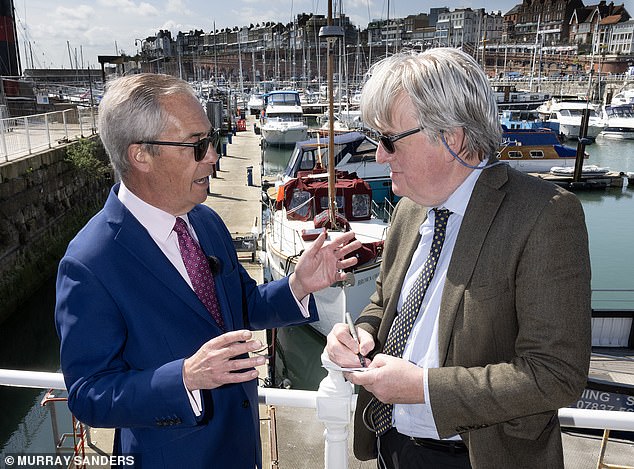
Despite his lofty claims that Reform UK can wipe out the Tries, Farage is deadly serious when I sit down with him later for a more in-depth interview
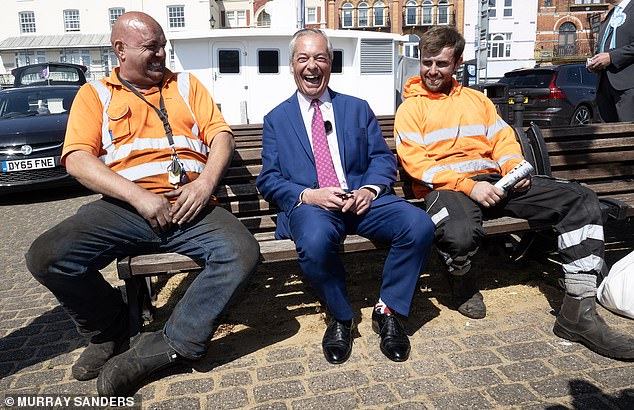
Farage having a jolly time with a pair of scrap metal workers in Ramsgate, Kent
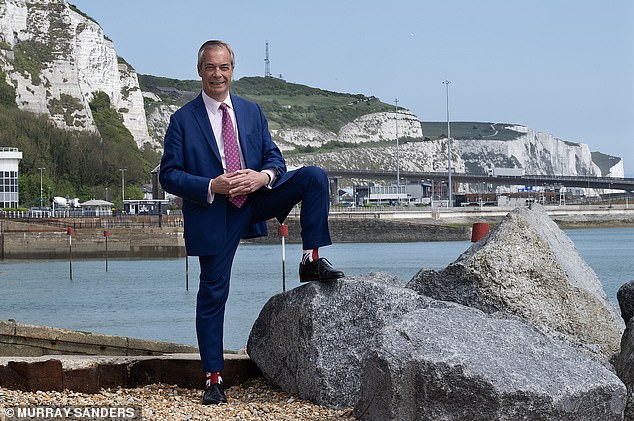
Farage standing beneath the White Cliffs of Dover in his Union Jack socks
For the first time, Reform are fielding more candidates (1,630 council plus six mayoral) than either Labour or the Tories and the polls predict they could capture as many as 450 council wards and at least two metro mayoralties.
If so, it could trigger a crisis of confidence in Kemi Badenoch’s leadership, not that Mr Farage wants her to go any time soon. Reeling off a list of regions where Reform are now ‘considerably ahead’ of the Tories, he says: ‘I hope Kemi stays – for a bit. I’d put some money in to keep her there.’
Mr Farage, a keen medal collector and scholar of the First World War, does know his history. As the Reform circus reaches the harbour in Ramsgate – where he stood as the parliamentary candidate in 2015 – he parks the politics to talk me through the extraordinary history of one of the Dunkirk ‘Little Ships’ based here.
But it is not just the Tories in his sights on Thursday.
This week, Sir Keir Starmer mocked Kemi Badenoch, telling her that Mr Farage would ‘eat the Tories for breakfast’.
‘But I am having him for lunch,’ Mr Farage adds with the ginny cackle of a man who might have cut back on the pints and fags – but only a little.
Thursday’s polls spell grave danger for Labour, too. There is the by-election in Runcorn, once Labour’s 16th safest seat until its sitting MP was convicted of assaulting a constituent.
Despite a field of 15 candidates, this is a two-way battle between two women with strong track records in local government – and Labour’s Karen Shore, a former teacher, is having the fight of her life to stop Reform’s Sarah Pochin, a former businesswoman, magistrate, mayor and Tory, from grabbing it.
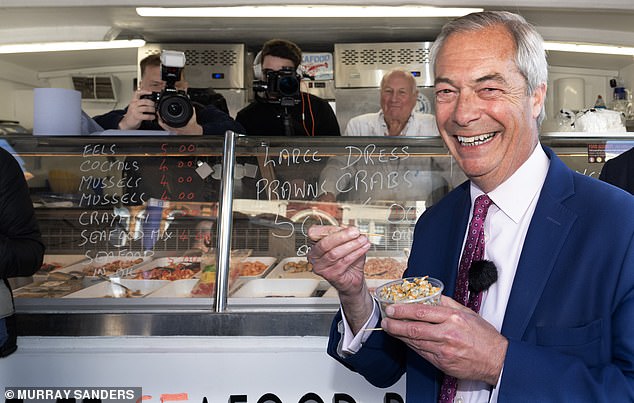
All smiles as Farage tucks into some fresh seafood in Ramsgate
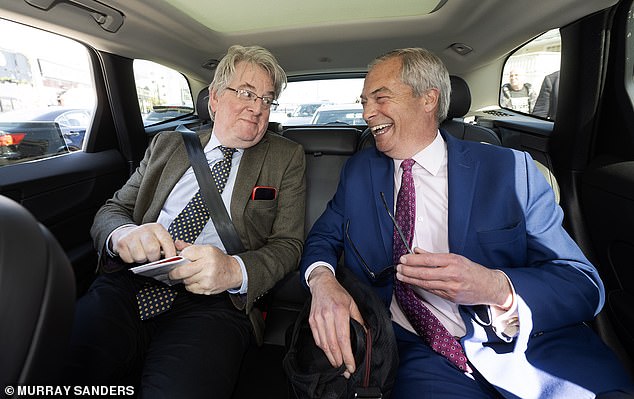
Farage tells me he has his sights on Labour areas as well as Tory strongholds
It’s fascinating because it is not the sort of ‘Red Wall’ Northern seat which should be ripe for a lurch to the Right. It was evenly split in the Brexit referendum and sits in the political and cultural orbit of tribally anti-Tory Liverpool. Yet business is brisk when I drop in on the Reform campaign office, wedged alongside a Greggs, a Poundland, a Turkish barber and several charity shops in the optimistically-titled ‘Runcorn Shopping City’.
‘Labour have used this as a dumping ground for years – whether for pollution, waste or illegal immigrants,’ says Sarah Pochin. ‘There’s no leisure centre, there’s no cinema, there’s no public services… They can’t get on the housing ladder because Karen Shore has stood up in council meetings and welcomed illegal immigrants to be housed in this constituency.’
The Labour candidate deplores Reform’s ‘scapegoating’ of immigrants, though she has publicly supported the decision to stop housing migrants in what was once an upmarket hotel and spa. Midway through the by-election campaign, the Government helpfully announced that Daresbury Park (‘Beautiful Places. Inspiring Spaces’ says a fading sign by the entrance to the 425-bed erstwhile conference centre) would no longer be used to house migrants.
Ms Shore faces the time-honoured incumbency problem for any Government candidate in a by-election, but is fighting this campaign on a blend of ’14 years of Tory cuts’ and her own track record as a teacher and the councillor in charge of highways on Cheshire West Council.
This is not without jeopardy in an election where potholes are a much bigger issue than, say, the Supreme Court ruling on what constitutes a woman.
Much of the seat is rural and I find plenty of prosperous pockets and two-car homes, like those in Dorchester Park where the Tories’ Sean Houlston is posting leaflets. The Conservatives were neck and neck with Reform for second spot here last time (coming a narrow third).
The absence of any Tory big-hitters from this campaign shows the party is not trying here. They would much prefer Runcorn to be a ‘Labour hold’ than a ‘Reform gain’. At a BBC Merseyside radio debate between the five main parties, the Lib Dem candidate ends up defending Labour.
The squeeze is on. Reform is the fruit.
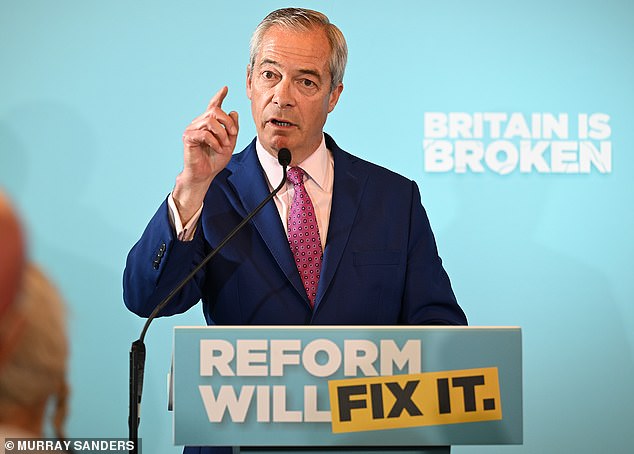
For the first time, Reform are fielding more candidates (1,630 council plus six mayoral) than either Labour or the Tories and the polls predict they could capture as many as 450 council wards and at least two metro mayoralties
Where Mr Farage is out in front by a mile is in those Brexit-loving, ex-industrial heartlands to the East of the Pennines. The mayoral and council elections in places like Lincolnshire and Yorkshire are showing hefty swings to Reform.
A Daily Mail straw poll in Doncaster marketplace this week revealed 90 per cent in favour of Mr Farage. Such polls are entirely unscientific, of course, but the strength of opinion is telling.
‘Labour can’t claim any longer to be the party of the working man and woman, it just isn’t,’ says Angie Trotter, 70. ‘I will be voting for Reform. I’m not racist and have no problem with people in genuine need but it’s gone too far and people have had enough,’ says Sarah Hilton, 44.
Having been a tribal Labour voter all his life, ex-miner David Fawden, 91, is about to switch.
In Grimsby, the reaction was even more pronounced. In short, we met just one person who was voting anything other than Reform. ‘I’m ex-Forces and have been prepared to fight for my country,’ says Karen Smith, 57. ‘Wholesale immigration has ruined this country. When Mr Farage says he’ll stop the boats I believe him and no one else has had the guts to do it.’
Outside the Corporation Arms on Freeman Street, former fisherman Pete Payne is angry: ‘You wouldn’t believe what this place used to be like. It’s a ghost town now. I put a lot of that down to Grimsby being flooded with people from other countries.’
Fish filleter Callum Bennett, 32, concurs: ‘The level of immigration in this country is an absolute joke. You just have to look around this town and see the vape shops and barbers springing up everywhere.’
I could be listening to Mr Farage himself, as he continues his day in Kent. ‘Don’t get me started on ‘Turkish barbers’,’ he says. ‘I make the point that these are springing up everywhere. They take cash only. They don’t cut anyone’s hair. They’ve all got a Lamborghini parked out the back.’
As for fishing, he is so wedded to the industry that, in the last couple of years, he has bought his own fishing boat.
‘I own it but it’s skippered by somebody else and has a recreational licence and a commercial licence. I just feel this is important and it has engaged me in the stupidities of the industry.’ It has not been a purely philanthropic investment. ‘We have a bluefin tuna licence so I can go to Cornwall and catch a bluefin tuna in the summer.’
He eats a lot of fish, something which may explain the new, leaner Farage. His old supporters from his days on the election trail in Ramsgate comment on it. ‘I’m a very careful eater – no junk food, no snacks. And I probably drink 30 fewer pints a week than I used to!’ Breakfast is still boiled egg and toast. He cannot run, since the plane crash which badly injured him in 2010, but he walks long distances every day, thanks to his two Labradors. ‘Black Labs matter!’ he says proudly.
He confesses that he is feeling ‘very tired’ by this stage of a national election campaign (and that his hardest task is turning his membership, which passed 225,000 this week, into a credible, crackpot-free fighting force with proper branches).
But then he stands up and delivers a dense and heavily statistical 30-minute speech with no autocue and barely a note at a Dover press conference.
Once, a speech like this would have been met with opprobrium and howls of outrage across the media and political spectrum.
Here is a politician pledging to restore ‘discrimination’ to public life. He tells us he will create a ministry dedicated to deportations and keep it outside the Home Office, which he regards as a hotbed of activist civil servants who would ‘wilfully obstruct policy.’ Asked if he fears that this is the ‘end of multiculturalism’, he fires back: ‘No! Sadly it is alive and well.’
All of the above would have been smelling salt statements ten years ago. Now, they barely get a raised eyebrow. Such is the Farage effect. This week, he fills the cover of The Economist, the Brexit-loathing manual of the corporate classes. ‘The Man Britain Cannot Ignore’ says the front page headline. Inside, the conclusion is withering: ‘Britain has already spent one decade struggling to get by in the world Mr Farage created. It can ill afford a second.’ Mr Farage is so pleased that he has posted the thing all over social media.
He seems a little more relaxed, less brittle than the Farage of old. I try to coax out a snarl and ask if he acts like a ‘Messiah’, as ex-Reform MP Rupert Lowe said in a Daily Mail interview, before being booted out of the party (in a spat which has now prompted legal action). ‘I don’t care. That had been coming for months,’ he says, puffing smoke out of the car window as we drive on to Sittingbourne.
‘He [Lowe] became increasingly convinced of his own greatness. People say that I fall out with X, Y or Z. The only people I ever fall out with are those who are trying to usurp me. If they were better than me, fine.’
And the charge that he is always travelling and never in his Clacton constituency? ‘Cobblers. I love it and I’ve just bought a house there.’
He speaks fondly but not uncritically of Donald Trump, but will not wade in on the tariff debate ‘because people would accuse me of ruining the deal if it went wrong’. As a result, he has not spoken to Mr Trump ‘for a couple of months’. He is delighted that the President is coming on a state visit, thought that Sir Keir Starmer ‘did pretty well’ in the Oval Office – ‘though a bit overawed’ – but does not expect to be invited to the state banquet.
‘It was the same on the last state visit. So I just went round to Winfield House [the US Embassy residence] for a private chat.’
He thinks Trump is being too soft on Russia, though, when it comes to Crimea: ‘What’s on the table would be rewarding aggression.’
And he is baffled by the President’s wish to annexe his neighbour to the North. ‘Canada shocks me. It really does,’ he says. ‘I understand him wanting Greenland – that’s a real estate deal with security implications. But Canada? They are our allies.’
Mr Farage says he would have liked to be British ambassador to Washington – as was mooted by some before Lord Mandelson took the job – and admits he thought long and hard before deciding to stand as an MP at the last election. ‘Did I really want this again? It’s awful for everybody around you.’
The two big ticking timebombs for Britain, he says, are public sector pensions and care for the elderly. Now Mr Farage qualifies for a free bus pass (at 61), does he give any thought to retirement? It would doubtless be like Christmas for the political classes.
He pauses for a nano-second. ‘I can’t think of anything worse.’







